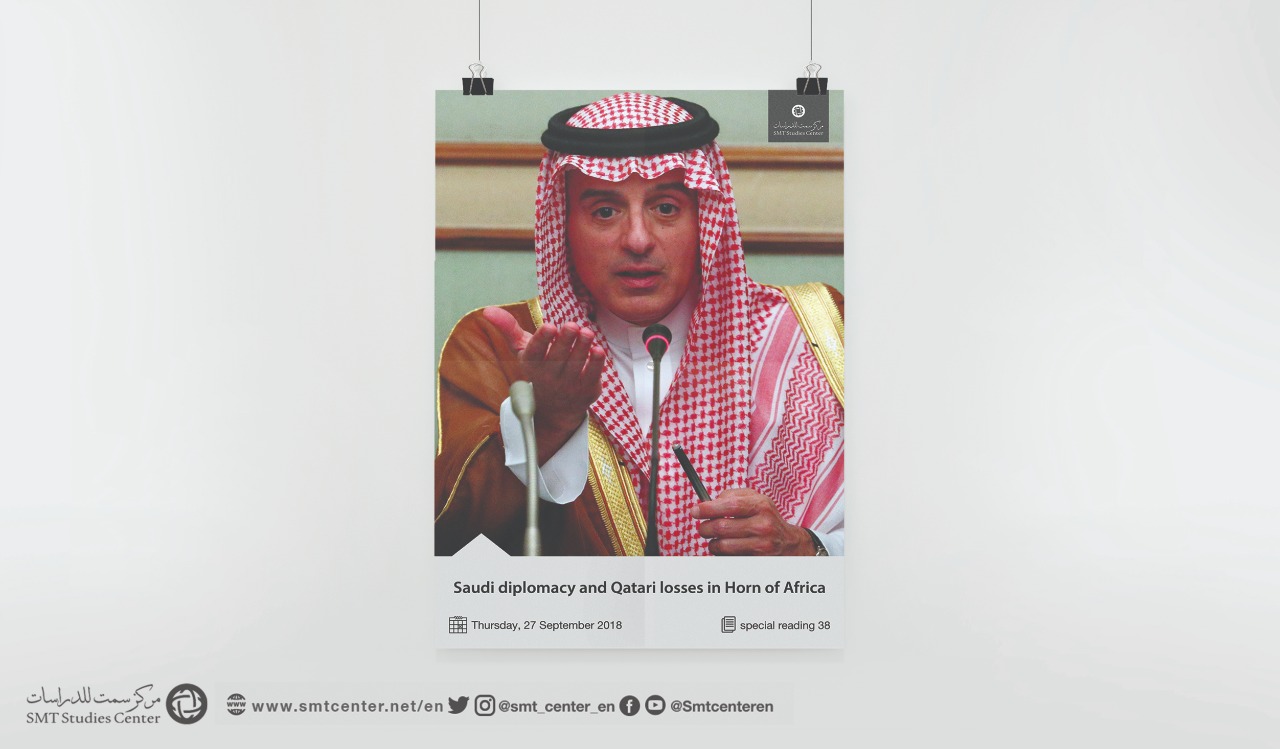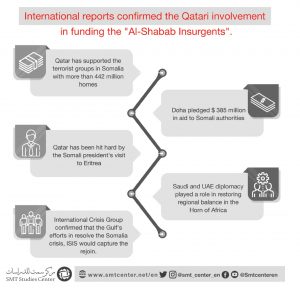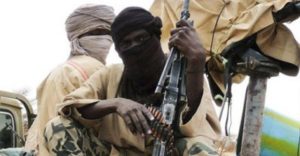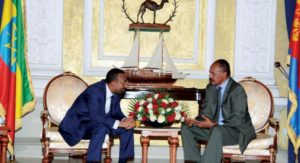Subscripe to be the first to know about our updates!

Saudi diplomacy and Qatari losses in Horn of Africa
The Horn of Africa has witnessed profound strategic developments that will expand to include all aspects of international and regional relations in the Horn of Africa, which are strategically linked to the Red Sea, it is considered as a one of the most important maritime transportation routes in the world. In recent years, the region witnessed the reconstruction and building of relations between the countries of the Horn of Africa. The region witnessed tensions and conflicts that continue to the recent time.
The Horn of Africa has many important economic and strategic resources. The major regional powers seek to control the regional balance through intensive interactions in recent years.
Strategically, Ethiopia pursues securing important corridors in the region in order to boost its foreign trade flow and transform into an economic and financial center as regional and international competition for seaports in the region intensifies by expanding economic and strategic partnerships and infrastructure development and linking with the neighboring countries of the Red Sea coast through the network of roads and railways.
In February 2018, the first electricity railway on the continent between the Ethiopian capital of Addis Ababa and the port of Djibouti, 750 kilometers long, was launched at a cost of about 3.4 billion dollars with Chinese funding. Ethiopia is also seeking to strengthen port diplomacy in the region by acquiring stakes in vital ports, as evidenced by its success in obtaining stakes in the ports of Djibouti and Port Sudan during two visits by Abe Ahmed to Djibouti and Sudan in May 2018 The tripartite agreement was signed in March 2018 between the government of Somaliland, which is not recognized internationally, Ethiopia and Dubai international Airport Company under which Ethiopia obtained a 19% in Berbera in Somaliland before the deal faltered after the intervention of the central government in Somalia. This comes in conjunction with the recent announcement by the Ethiopian Government of the start of the inauguration of Ethiopian naval forces, although Ethiopia is a locked-up country. It means that it is seeking access to international waters. Ethiopia plans to launch a 5,000 km railway network linking it with Kenya, Sudan and South Sudan by 2020, as part of its regional economic integration strategy aimed at breaking its maritime isolation and strengthening its regional role in the region.Ethiopia seeks to deepen its political, economic and military ties with a number of regional powers such as Turkey, Israel and Qatar in order to expand its foreign alliances.
In this context Israeli president visited Addis Ababa in May 2018 to renew the partnership and deepen relations with the new government. Ethiopia seeks also to contain its traditional crises in its regional environment by activating economic partnership diplomacy and economic integration, raising questions about whether Ethiopia really wants to change its policy in the region, or whether Abe Ahmed’s government will continue to apply the same aspirational Ethiopian policy Regionally and internationally, established by Meles Zenawi in the 1990s.
Ethiopian strategic vision transformed as a result to changes in internal politics in 2018. The most important repercussions were the arrival of Abe Ahmad, and the growing regional support (Egypt, Saudi Arabia and the UAE) for the Ethiopian role in the region, in the recent moves that have led to calm the differences between Eritrea and Ethiopia, and also to calm relations between Djibouti and Eritrea.

Saudi efforts to support stability in the Horn of Africa
Saudi Arabia played great role to bring Djibouti and Eritrea closer to overcome their border problems. Despite Ethiopian and Somali mediation between Eritrea and Djibouti, Djibouti’s Foreign Minister, Mohammed Ali Yusuf, has played a Saudi role in mediating between the two countries.
Saudi efforts to make peace in the Horn of Africa Riyadh hosted a meeting of presidents of Ethiopia, Eritrea and Djibouti to sign a reconciliation agreement between Ethiopia and Eritrea on the one hand and to defuse Eritrean-Djibouti disputes on the other. Riyadh also hosted former Somali President Abdullahi Yusuf and the Islamic Courts Union in Jeddah in 2007 to sign an initiative to stop the war between the two sides in Somalia.
Saudi role aimed at addressing the role of the country in Djibouti, whose role was stable during the Gulf crisis. Through mediation between Eritrea and Djibouti, both sides agreed to normalize relations during a conference of Ethiopian, Somali and Eritrean foreign ministers in September 2018.
In the face of the Eritrean-Iranian rapprochement, Saudi Arabia sought to contain the strategic imbalance in the region through military efforts that helped disengage Asmara and Tehran, and the United Arab Emirates established a military base in the coastal city of Assab.
In addition, one can point to the role of the UAE in mediating the restructuring or arrangement of the Horn of Africa, and that Ibn Zayed’s visit to Ethiopia in June 2018 devoted a new picture to the international media that the Horn of Africa has become a “pivotal circle in regional security” The implications of the Saudi-Emirati move in this geo-strategic ocean are far from the approach of the previous Ethiopian government, which was more inclined to the Turkish-Qatari alliance.
Strategic transformation in the Horn of Africa
The Horn of Africa region witnessed dramatic developments, the most important of which was the Ethiopian-Eritrean reconciliation after 333 years of fighting, as well as a diplomatic conflict that saw a waste of resources and energy between them.
Many international forces have stepped up their presence in the Horn of Africa and are struggling to strengthen their direct presence at the Bab al-Mandab Strait, one of the most important waterways. The number of military bases in the region increased, such as the American, French, Chinese and Japanese bases in Djibouti. In addition to the UAE base in the port of Assab in Eritrea and Berbera port in Somaliland. Other international actors are also expected to intervene, such as Russia, which is seeking to strengthen its presence in the Horn of Africa
The Qatari role was influenced by the strategic changes in the African century. Developments in the Horn of Africa have been reflected on its role in the region. The Somali-Eritrean rapprochement necessarily affects its role in the Horn of Africa, which used to provide financial and political support to terrorist organizations in the region.
Qatari role in the Horn of Africa is to achieve the following objectives:
- Take a strategic role to strengthen its international standing.
- Obtaining a more advanced position in the Muslim world, as part of a phantom leadership attempt.
- Economic benefit, especially with the discovery of gas in the waters of the region.
- Undermining the roles of competing forces, notably the UAE, Egypt and Saudi Arabia.
So Doha has provided $ 210 million in development aid and signed a bilateral agreement with the Somali government worth $ 200 million, claiming that the aid is earmarked for infrastructure projects, education and economic empowerment. In contrast, Doha aims indirectly to support extremist organizations in Somalia to use them to launch attacks in specific countries to serve the interests of the country and Iran in the region.
Qatar has provided a financial support through Qatar National Bank and has contracted several projects in Ethiopia under humanitarian assistance, whose political dimension cannot be ignored directly or indirectly to the majority of existing armed organizations not only in the Horn of Africa, but throughout the country.
The military has provided military assistance to Somalia through government cooperation between the two countries. Such means which used by the ruling regime in Qatar to support terrorism. According to US documents issued by the US State Department, Qatar has provided financial support to the Somali Mujahideen Youth Movement, which is responsible for numerous terrorist attacks against the transitional government in Somalia.
Diplomatically, Qatar has played a heavy role in a number of conflicts in the Horn of Africa. It has sought to support political forces and influential figures and has helped establish and manage various development projects.
Qatar has used a number of African languages such as Swahili to reach 100 million people and fabricated reports on the Somali refugees in Ethiopia with the support of the Ogaden National Liberation Front funded by Doha. The report accused the Ethiopian government of carrying out persecution and torture The refugees are pushing them to join the front
Doha has succeeded in gaining the confidence of the Somali authorities through the assistance and large funds it provides to the officials there, urging them to abandon their neutral position from the recent crisis and to align their ranks in order to implement their suspicious agenda in return for supporting and implementing many vital projects in Somalia. National reconciliation among Somalis.
Otherwise, Qatar lacks tools that many countries possess, especially the cultural and historical instruments. The religious tool in the low-value country situation, due to its lack of weight in the Muslim world, has created a state of contradiction and conflict in many of its political positions.
The Eritrean-Somali rapprochement necessarily affects the country’s role in the Horn of Africa. Doha provides financial and political support to terrorist organizations in the region. This convergence provides an opportunity for economic integration. Since independence, Ethiopia has been lacking sea ports. Eritrea has a coastal strip. The integration of the two countries is a guarantee of continued coordination and ending of conflicts that have deprived the two countries and peoples of the geographical location to achieve common and equal interests. This convergence also helps protect the Horn of Africa from external penetration.
Doha lost ground and the enabling environment to achieve its agenda. This convergence will be a gain and a historic achievement for the Ethiopian Prime Minister Abi Ahmed, who initiated the acceptance of the Algiers agreement », adding that« all former presidents of Ethiopia succeeded in achieving development, but failed in the file of peace with Eritrea, enhancing the distinction of Abu Ahmed, who seemed confident of completion Normalization process with Asmara.

Conclusion
- Regional powers such as Saudi Arabia, the United Arab Emirates and Egypt have led comprehensive efforts to reshape the regional balance in the Horn of Africa because of its strategic importance to Arab national security, especially in the face of recent challenges such as Iran, Qatar and Turkey’s terrorism in the Middle East and the Horn of Africa.
- Qatar has played a clear sabotage role in the Horn of Africa. It supported of extremist organizations in the region.
- Qatar has used various forms of financial, military and diplomatic support to achieve its fundamental interests. The most prominent Qatari interest is to compensate for its modest status. Doha is using its financial resources to make up for the lack of other aspects.
- Saudi Arabia and the United Arab Emirates have played an important role in mediating between the countries of the Horn of Africa to restore stability in the region and confront the country’s role in supporting terrorism.
- Saudi efforts succeeded to confront the Qatari role, restoring strategic balance in the Horn of Africa, and supporting cooperation among the countries of the region
- Due to Saudi efforts, Qatar lost much of its power in supporting its goals.
Prepared by; Unit of Political Studies in SMT Studies CEnter

Reference;
- Gulf states in the Horn of Africa: What role do they play?,http://cutt.us/pIlVz
- Kristian Coates Ulrichsen, The Geopolitics of Insecurity in the Horn of Africa and the Arabian Peninsula, http://cutt.us/m5itV
3. Rival Arab powers take their fight to Africa, Africa Confederation Magazine, Vol 59 No 3, Available at; http://cutt.us/exRrw
4. Dominic Dudley, East Africa Becomes A Testing Ground For UAE And Qatar As They Battle For Influence And Opportunity, Forbes,http://cutt.us/bwnHm
5. خادم الحرمين يرعى توقيع اتفاقية سلام بين إثيوبيا وإريتريا بحضور ولي العهد وغوتيريش، جريدة الشرق الأوسط، 7محرم 1440 هـ – 17 سبتمبر 2018 ، متاح على الرابط: http://cutt.us/skzJ1
6. الملك سلمان يرعى اتفاقية جدّة بين إثيوبيا وإريتريا، صحيفة اللواء، متاح على الرابط: http://cutt.us/XM2zD
- وكالة سبوتنيك للأنباء، الإمارات والصومال… مؤشرات على تحسن العلاقات بعد أزمتي الطائرة والقاعدة العسكرية، متاح على الرابط: http://cutt.us/2utzU
- وكالة سبتوتنيك للأنباء، قطر تقدم هدية “الأغراض المهمة” إلى الصومال، متاح على الرابط: http://cutt.us/rlWO9
- وكالة سبتوتنيك للأنباء، بعد قرار عسكري تجاه الإمارات…حافلات قطرية تدخل الصومال، متاح على الرابط: http://cutt.us/dDIe